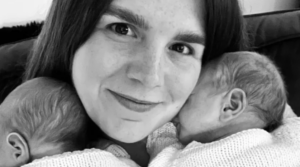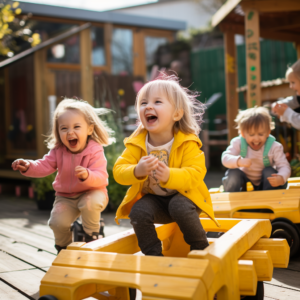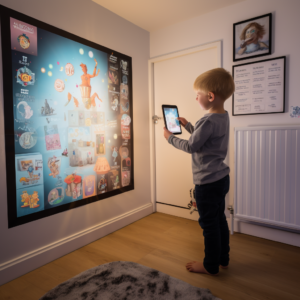Navigating the early years of childhood brings a plethora of challenges and milestones, not least of which is the development of social skills. These skills are the cornerstone upon which children build their future relationships and understand their place within the world. For toddlers, who are at the very beginning of this journey, learning to make friends and engage with their peers is not just beneficial; it’s essential. “Building Social Skills: Encouraging Your Toddler to Make Friends” is designed to guide parents and caregivers through the nuanced process of nurturing these crucial abilities in their young ones.
In the formative years of life, toddlers are not only mastering the art of walking and talking but are also laying the groundwork for interpersonal skills that will define their social interactions for years to come. It’s a time when every playdate and nursery rhyme sung in unison can serve as a lesson in communication, empathy, and the art of friendship. However, the path to becoming a social butterfly isn’t the same for every child. Some may naturally gravitate towards making connections, while others may find it a winding path filled with hurdles and hesitations.
This article delves into the why and how of encouraging your toddler to forge friendships, offering a blend of expert advice, practical tips, and relatable case studies. From understanding the signs of social readiness to navigating the inevitable conflicts, we’ll explore strategies to create enriching social opportunities for your child. By fostering an environment where positive social behaviours are encouraged and resilience is built, parents and caregivers can lay a strong foundation for their toddlers’ future social success.
Embarking on this journey requires patience, insight, and a proactive approach to guiding toddlers as they make their first forays into the world of social interactions. Whether it’s through organising playdates, modelling positive behaviour, or simply being there to navigate the ups and downs of friendships, your role is pivotal. With the right support, every toddler can learn the joy of making friends, sharing experiences, and developing the social skills that will serve them throughout their lives.

Understanding the Importance of Social Skills in Toddlers
The early years of a child’s life are marked by rapid development and growth, not just physically but emotionally and socially as well. For toddlers, developing social skills is as crucial as learning to walk or talk. These skills are the building blocks for successful interactions throughout their lives, shaping their ability to communicate, empathize, and form meaningful relationships. This chapter explores the significance of social skills in early development, identifies signs of social readiness, and presents a case study illustrating the journey of a toddler named Jamie, who navigated the path to socialisation with the support of his family.
The Role of Social Skills in Early Development
Social skills encompass a wide range of competencies, from the basic — such as taking turns and sharing — to more complex ones like negotiating and resolving conflicts. These abilities enable toddlers to interact effectively with their peers and adults, laying a foundation for their emotional intelligence. Social skills in early childhood contribute to a toddler’s sense of belonging and can significantly impact their future academic and personal success. They learn to understand their own emotions, empathize with others, and navigate the social world around them. This holistic development is essential for building self-confidence and a positive self-image.
Recognising the Signs of Social Readiness
Every child’s social journey is unique, but there are common milestones that signal a toddler’s readiness to engage with others. These include showing interest in other children, engaging in or imitating simple social games, responding to social cues from adults and peers, and exhibiting curiosity about the world around them. For instance, a toddler might start observing other children playing or attempt to join in play by offering a toy. Such actions indicate an emerging comfort with social interaction and a readiness to explore friendships.
It’s important for parents and caregivers to observe these signs and respond by providing appropriate opportunities for socialisation. Recognising and encouraging these early attempts at social interaction can foster a positive attitude towards making friends.
Case Study: Jamie’s Journey to Socialisation
Jamie, a two-year-old from a quiet, introverted family, initially showed little interest in interacting with other children. Preferring the company of his parents or solo play, Jamie’s social skills were developing at a slower pace compared to his peers. However, Jamie’s parents noticed his occasional curiosity towards other children’s play activities, especially during park visits.
Observing this interest, they began encouraging him to engage in parallel play, a form of play where children play alongside each other but do not directly interact. They arranged playdates with a small, consistent group of children, creating a safe and familiar environment for Jamie. Over time, Jamie began to interact more with his peers, first through non-verbal communication like sharing toys, and gradually moving to verbal exchanges and cooperative play.
Jamie’s parents also played an active role in modelling social behaviours, such as taking turns and expressing emotions verbally. By providing gentle guidance and positive reinforcement, they supported Jamie’s social development at his own pace.
Through patience and tailored strategies, Jamie’s confidence in social settings improved. He started to initiate interactions, showing particular interest in group games that required turn-taking and cooperation. Jamie’s journey illustrates the impact of parental support and the importance of recognising and nurturing a child’s readiness to engage socially.
Understanding the importance of social skills in early development is the first step in supporting your toddler’s journey towards making friends and building relationships. By recognising the signs of social readiness and responding with appropriate encouragement, parents and caregivers can play a pivotal role in their child’s social development.
Jamie’s case study serves as a testament to the positive outcomes that can arise from a thoughtful and supportive approach to encouraging social skills in toddlers. With the right support, every toddler can navigate the path to becoming a confident and socially adept individual.
Strategies to Encourage Social Interactions
Social interactions are pivotal in the developmental journey of toddlers. These early experiences of making friends, sharing, and playing together lay the groundwork for their future social dynamics and interpersonal relationships. As parents and caregivers, fostering environments that encourage these interactions is essential. This chapter focuses on effective strategies to promote socialisation, including creating opportunities for social engagement, the benefits of role-playing, and how social skills games can facilitate learning. We also explore a case study of Lily, whose story highlights the transformative power of intentional social skill development.

Creating Opportunities for Socialisation
One of the most straightforward ways to encourage social development in toddlers is by creating ample opportunities for them to interact with their peers. This can be achieved through various means:
- Organising Playdates: Small, regular playdates with the same group of children can provide a comfortable setting for toddlers to form friendships and learn social norms.
- Joining Toddler Groups: Community groups or classes designed for toddlers, such as music, dance, or art classes, offer structured environments where children can engage in shared activities.
- Public Playgrounds: Regular visits to playgrounds allow toddlers to interact with a wider range of peers, encouraging adaptability and diverse social experiences.
Role-Playing and Social Skills Games
Interactive play is a powerful tool in teaching toddlers about social interactions. Role-playing and social skills games not only entertain but also educate, allowing children to practice and internalize positive social behaviors.
- Role-Playing: By assuming different roles, toddlers can explore various social scenarios and responses. For example, playing “house” allows them to practice sharing, negotiation, and empathy.
- Social Skills Games: Games that require turn-taking, sharing, and cooperative play, such as board games designed for young children, can reinforce these essential social skills in a fun and engaging way.
Case Study: Lily’s Leap into Friendship
Lily, an only child accustomed to solitary play, initially struggled with the concepts of sharing and turn-taking. Observing her challenges, her parents introduced targeted role-playing activities and social skills games into her routine.
Strategy Implementation
Lily’s parents started by organizing small playdates, carefully choosing children with whom Lily felt comfortable. During these playdates, they would set up role-playing scenarios that mimicked real-life social situations, such as sharing toys or working together to build a block tower. They also introduced simple board games that required players to wait their turn and follow rules.
Impact
Over time, Lily began to show significant improvement in her social interactions. The role-playing sessions provided safe and structured environments for her to practice sharing and empathizing with others, while the games taught her the importance of patience and cooperation. Lily’s parents noticed a marked increase in her willingness to engage with peers, initiate play, and navigate conflicts more constructively.
Reflection
Lily’s story illustrates the effectiveness of incorporating role-playing and social skills games into a child’s routine to enhance their social capabilities. Through intentional practice and support, she developed the skills necessary to form friendships and interact positively with her peers.
Fostering social skills in toddlers requires thoughtful strategies and patience. By creating opportunities for socialisation, engaging in role-playing, and incorporating social skills games, parents and caregivers can significantly influence their child’s ability to interact with others. The case study of Lily highlights the potential for growth and development when these strategies are applied consistently and with sensitivity to the child’s individual needs. As toddlers learn to navigate social situations with confidence and empathy, they lay the foundation for a lifetime of meaningful relationships and effective communication.
Tips and Advice for Navigating Social Hurdles
While encouraging social interactions forms the bedrock of developing social skills in toddlers, navigating the inevitable challenges that arise is equally important. From managing conflicts to fostering resilience and empathy, this chapter provides practical tips and advice for parents and caregivers to help toddlers overcome social hurdles. Through the case study of Ethan, we explore how guided interactions and understanding can turn conflicts into valuable learning opportunities.
Encouraging Positive Social Behaviours
Positive reinforcement plays a crucial role in encouraging desirable social behaviours in toddlers. Here are some strategies:
- Praise and Acknowledgement: Recognize and verbally praise your toddler for positive social interactions, such as sharing or using polite words. This reinforces their good behaviour and encourages them to repeat it.
- Modeling: Children learn a great deal from observing adults. Model positive social interactions in your daily life, demonstrating kindness, patience, and empathy in your interactions with others.
Handling Conflicts and Building Resilience
Conflicts are a natural part of social interactions and can provide critical learning experiences if handled constructively.
- Guided Conflict Resolution: Instead of immediately stepping in to resolve conflicts, guide your toddler through the process of expressing their feelings and understanding the other child’s perspective. This teaches them valuable problem-solving skills.
- Teaching Emotional Regulation: Help your toddler identify and label their emotions. Teaching them appropriate ways to express feelings like frustration or anger is key to developing emotional intelligence.
Case Study: Ethan’s Encounter with Conflict
Ethan, a three-year-old, often found himself in disputes over toys at his nursery. These conflicts were a source of distress for Ethan and a concern for his caregivers.
Strategy Implementation
Ethan’s caregivers decided to use these conflicts as teachable moments, guiding Ethan through the process of conflict resolution. They encouraged him to express why he was upset and then helped him listen to the other child’s perspective. They also introduced simple phrases Ethan could use to express his feelings, like “I’m feeling sad when I can’t play with the toy.”
Impact
Over time, Ethan began to approach conflicts with a greater sense of calm and understanding. He started using his words to express his feelings and was more willing to listen to others. This not only reduced the number of conflicts but also improved Ethan’s relationships with his peers.
Reflection
Ethan’s story highlights the importance of teaching toddlers emotional regulation and conflict resolution skills. By addressing conflicts constructively, caregivers can help toddlers learn to navigate social challenges with empathy and resilience.
Conclusion
Building social skills in toddlers is a multifaceted journey that extends beyond facilitating interactions to equipping them with the tools to navigate the complexities of relationships. Encouraging positive behaviours, guiding them through conflicts, and teaching emotional regulation are all crucial components of this developmental phase. With patience, understanding, and consistent support, parents and caregivers can help lay the foundation for a lifetime of healthy social interactions.
Final Say
Fostering social skills in toddlers is an investment in their future well-being and success. By creating opportunities for socialisation, engaging in role-playing and games, and navigating social hurdles with empathy and guidance, we can support our toddlers in developing the skills necessary for meaningful connections and interactions. The journey is filled with challenges, but the rewards—a confident, empathetic, and socially adept child—are immeasurable. Let’s embark on this journey with patience, love, and the commitment to guiding our toddlers through the intricate dance of social development.







